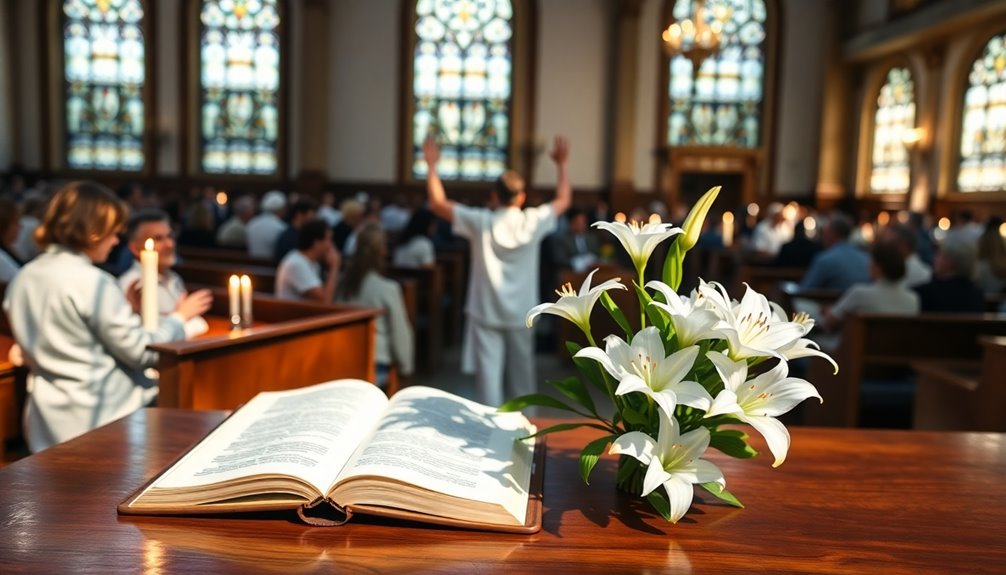Reincarnation isn't mentioned in the Bible; instead, it emphasizes resurrection and individual judgment after death. Hebrews 9:27 clearly states that everyone dies once and faces judgment, supporting a singular life cycle. When Jesus refers to being "born again" in John 3:3, he's talking about spiritual renewal, not physical rebirth. Many church teachings, including those from the Council of Trent, reinforce this view, distinguishing resurrection from reincarnation. Early Jewish beliefs also varied, showing that resurrection was more commonly accepted. If you're curious about how these concepts interact, there's more to explore regarding biblical teachings on the afterlife.
Key Takeaways
- The Bible emphasizes resurrection over reincarnation, with Hebrews 9:27 stating each person dies once and faces judgment.
- Jesus' reference to being "born again" (John 3:3) pertains to spiritual rebirth, not physical reincarnation.
- Early Jewish beliefs, including those of the Pharisees, supported resurrection, while reincarnation was not widely accepted in biblical texts.
- Ecclesiastes 12:7 indicates that the spirit returns to God after death, supporting the concept of final judgment rather than cyclical rebirth.
- The Council of Trent and traditional Christian doctrine reject reincarnation, affirming the resurrection of the body and eternal life.
Introduction

Reincarnation is a concept that sparks curiosity and debate, especially when examined in the context of the Bible. While many people wonder if the Bible supports the idea of reincarnation, it's crucial to note that this concept isn't explicitly mentioned in the Scriptures.
Traditional Christian doctrine emphasizes resurrection over reincarnation, asserting that after death, you'll face judgment rather than returning in another form. Hebrews 9:27 clearly states that each person is destined to die once and then face judgment.
When Jesus spoke about being "born again" in John 3:3, he referred to spiritual regeneration, not reincarnation. Some interpretations mistakenly link biblical passages, like the connection between John the Baptist and Elijah, to support reincarnation, but this is more about spiritual lineage than the cycle of rebirth.
Historical church teachings, particularly those from the Council of Trent, have consistently rejected reincarnation, reinforcing the belief in a singular life that leads to eternal judgment.
Understanding these distinctions helps clarify the Bible's stance on the soul's journey and the promise of eternal life, steering you away from misconceptions about reincarnation.
Biblical Verses on Rebirth

As you explore the topic of rebirth in the Bible, you'll find key verses that highlight differing interpretations.
Primary references like John 3:3-7 offer insights into spiritual rebirth, while Hebrews 9:27 emphasizes a singular life followed by judgment.
These verses set the stage for understanding how the Bible addresses the concept of reincarnation.
Primary Bible References
The Bible offers several key verses that address the concepts of life, death, and rebirth, although it doesn't support the idea of reincarnation. Hebrews 9:27 clearly states, "It is appointed for man to die once," emphasizing a singular life cycle.
When Jesus speaks of being "born again" in John 3:3, He refers to spiritual regeneration, not a new physical existence.
In Matthew 17:10-12, there's a connection made between John the Baptist and Elijah, yet this is viewed as a unique identification rather than evidence of reincarnation.
Ecclesiastes 12:7 reinforces the notion that upon death, the spirit returns to God, further supporting a singular life perspective.
The concept of resurrection, particularly in I Corinthians 15, highlights the belief in a one-time physical resurrection for judgment, contrasting sharply with the cyclical nature associated with reincarnation.
Thus, while the Bible discusses life after death and resurrection, it ultimately points to a definitive judgment following one earthly life, steering clear of the idea of multiple lifetimes.
Secondary Bible References
Exploring secondary Bible references reveals additional insights into the concept of rebirth, often highlighting spiritual transformation rather than physical reincarnation. In John 3:3-7, Jesus emphasizes the necessity of being "born again," which points to spiritual regeneration, underscoring the idea that each human soul lives one life.
This aligns with Hebrews 9:27, stating, "It is appointed for man to die once," reinforcing the belief in a single earthly existence followed by judgment.
Further, in Matthew 17:10-12, Jesus identifies John the Baptist as the returning Elijah. Many scholars interpret this not as reincarnation, but as a reference to spiritual identity, emphasizing continuity of purpose rather than physical rebirth.
Ecclesiastes 12:7 affirms that the spirit returns to God after death, supporting the notion of a final judgment rather than a cycle of rebirths.
The New Testament consistently focuses on resurrection and eternal life through Christ, as seen in John 11:25-26. Here, Jesus offers hope in resurrection, steering believers away from the concept of reincarnation and towards the promise of eternal life, shaped by our one earthly journey.
Ancient Jewish Beliefs on Afterlife

In ancient times, Jewish beliefs about the afterlife centered around Sheol, a shadowy realm where the dead lingered rather than a clear-cut understanding of reincarnation. Sheol wasn't a place of punishment or reward but rather a waiting area for souls.
The Pharisees, a significant sect during the Second Temple period, embraced the idea of resurrection, believing that souls would rise again at the end of days. This contrasted sharply with the Sadducees, who denied any form of afterlife.
While early Jewish writings like the Book of Enoch explored themes of judgment and the fate of souls, they didn't explicitly endorse reincarnation. However, some mystical traditions, particularly Kabbalah, hinted at the possibility of souls returning to rectify past mistakes, suggesting a more fluid understanding of existence beyond death.
Additionally, the idea of the pre-existence of souls appeared in some Jewish thoughts, although it wasn't universally accepted or linked directly to reincarnation as understood in Eastern religions.
Cultural Views on Rebirth

Rebirth captures the imagination of many cultures, each interpreting it through their unique religious lenses. In Hinduism and Buddhism, the cycle of reincarnation is vital for spiritual evolution, where one's actions influence future lives. This karmic justice emphasizes personal growth and moral accountability, shaping how individuals approach life.
Ancient Greek philosophers like Pythagoras and Plato also pondered the soul's immortality and its journey through multiple lives. Their ideas laid the groundwork for later spiritual movements, demonstrating an early fascination with the concept of rebirth.
Kabbalistic teachings enrich this narrative, suggesting that the soul undergoes multiple lifetimes to achieve spiritual fulfillment, reinforcing the notion of interconnectedness among experiences.
In modern times, the New Age movement has popularized reincarnation, often merging it with diverse spiritual practices and beliefs. While it may stray from traditional contexts, it still echoes the themes of personal growth and spiritual evolution.
Across these varying perspectives, the idea of rebirth serves as a reminder that life is a continuous journey, encouraging you to embrace your experiences and learn from them as you move forward in your spiritual path.
Reincarnation Versus Resurrection Debate

When you explore the differences between reincarnation and resurrection, you'll find key misconceptions that need debunking.
Resurrection emphasizes a singular, eternal life after death, while reincarnation suggests multiple earthly existences.
This fundamental contrast raises important questions about how each belief aligns with biblical teachings.
Debunk Reincarnation Misconceptions
Many people mistakenly conflate reincarnation with the biblical concept of resurrection, leading to confusion about the afterlife. The Bible clearly emphasizes resurrection as a singular event for eternal life. Hebrews 9:27 states, "it is appointed for man to die once," followed by judgment, which sharply contrasts with reincarnation's cyclical nature.
When Jesus talks about being "born again," He refers to spiritual regeneration, not the idea of living multiple earthly lives. Misinterpretations of scripture, like Jesus identifying John the Baptist with Elijah, showcase unique spiritual roles rather than supporting reincarnation.
The central Christian doctrine of resurrection promises believers eternal life with God, whereas reincarnation suggests multiple chances for redemption, contradicting core biblical teachings. Early church fathers like Tertullian and Origen firmly rejected reincarnation, highlighting its absence in Christian doctrine.
Understanding these distinctions is vital for grasping the biblical view of the afterlife. Embracing the resurrection as the pathway to eternal life clarifies that Christianity focuses on one chance to embrace faith, not the repeated cycles proposed by reincarnation beliefs.
Reincarnation Contradicts Biblical Resurrection
The debate surrounding reincarnation and biblical resurrection highlights a fundamental divergence in beliefs about the afterlife.
In Christianity, the Bible emphasizes resurrection as a singular event, reinforcing that "It is appointed for man to die once" (Hebrews 9:27). This directly contradicts the idea of reincarnation, where a soul is believed to inhabit multiple bodies across various lifetimes.
Christian doctrine teaches that after death, individuals face immediate judgment, determining their eternal life or punishment. This rejects the cyclical nature of reincarnation, focusing instead on a definitive resurrection. Jesus' resurrection is central to the Christian faith, affirming that believers receive eternal life through Him, not by being reborn into new physical forms.
Moreover, the New Testament presents being "born again" as a spiritual transformation rather than a literal reincarnation.
Biblical references to resurrection emphasize restoring the same identity and body, transformed for eternal life. This clear distinction underscores that reincarnation contradicts the essence of biblical resurrection, which promises believers a singular, transformative experience after death, rather than a cycle of rebirths.
Spiritual Growth Through Understanding

As you reflect on your life choices, consider how they shape your spiritual growth within the framework of a single earthly existence.
Engaging with your community about afterlife beliefs can further enhance your understanding of accountability and purpose.
Together, these reflections can lead to a deeper connection with your faith and a clearer path toward personal transformation.
Reflect on Life Choices
Reflecting on your life choices can be a transformative journey toward spiritual growth. In the context of biblical teachings, you understand that every decision you make holds significance, as Hebrews 9:27 reminds you that judgment follows one life.
This perspective encourages you to align your choices with spiritual values, focusing on redemption and repentance rather than the notion of multiple lifetimes.
As you contemplate your actions, consider the principle in Galatians 6:7: you'll reap what you sow. This reinforces the idea that your life choices directly impact your spiritual journey and eternal outcomes.
When you engage with these teachings, you recognize that each decision is an opportunity for growth. Jesus' emphasis on repentance invites you to transform your life by consciously choosing actions that reflect your faith and commitment to God's principles.
Community Reflection on Afterlife Beliefs
Many people find that community discussions about afterlife beliefs can significantly enhance their spiritual growth. When you engage with others, you'll encounter diverse interpretations of biblical teachings, like the concepts of resurrection versus reincarnation. These conversations can spark critical thinking, helping you examine your own beliefs and deepening your understanding of the afterlife.
Reflecting on passages such as Hebrews 9:27 opens up meaningful dialogues about judgment and eternal life in Christian theology. By exploring how early Christian communities shaped their views on the afterlife, you can connect more personally with your faith. This process allows you to see how collective beliefs evolve and how they can impact your spiritual journey.
Participating in community forums and discussions not only sheds light on common questions about afterlife beliefs but also creates a supportive environment for spiritual exploration. As you share your thoughts and listen to others, you'll find your beliefs challenged and refined, enriching your understanding of the spiritual realm.
Ultimately, these conversations foster growth, guiding you through the complexities of afterlife beliefs and enhancing your overall spiritual experience.
Biblical Teachings on Resurrection

Resurrection stands as a fundamental belief in Christianity, emphasizing the transformation and eternal life promised to believers. In the New Testament, particularly in I Corinthians 15, the resurrection is described as a pivotal event that involves the transformation of the body. This transformation signifies not just a return to life but a new, glorified existence that transcends earthly limitations.
Jesus Christ's resurrection is central to this doctrine, representing the ultimate victory over death. As noted in Matthew 28:5-6, the angel's declaration, "He isn't here; for He's risen," reinforces the promise of eternal life for those who believe. This contrasts sharply with the cyclical idea of reincarnation.
Hebrews 9:27 clearly states, "It is appointed for man to die once," indicating that each person faces judgment after a singular life.
In Christian theology, the resurrection affirms individual accountability, as you'll find in Matthew 25:46, which discusses the final judgment. Rather than being reborn into new earthly forms, believers are promised a transformed body, as expressed in Philippians 3:20-21, underscoring the unique and eternal nature of the resurrection.
Additional Resources

To further explore the distinction between resurrection and reincarnation, various resources are available that delve into theological discussions and interpretations.
You can start by examining theological commentaries that analyze biblical texts regarding the afterlife. These commentaries often highlight how Christian doctrine, particularly following the Council of Trent, has shaped views on resurrection while largely rejecting reincarnation.
Online forums and scholarly articles also provide diverse perspectives on the interpretations of scripture. For instance, discussions surrounding Gnostic interpretations, such as the relationship between John the Baptist and Elijah, offer insight into how some early Christians may have viewed reincarnation.
However, it's essential to note that mainstream Christian doctrine doesn't support these interpretations.
Additionally, exploring works by scholars who argue that early Christian writings included concepts resembling reincarnation can be enlightening. These discussions reveal how certain ideas were excluded from the established biblical canon.
Frequently Asked Questions
Does the Bible Mention Anything About Reincarnation?
The Bible doesn't mention reincarnation directly. Instead, it emphasizes resurrection and eternal life.
You'll find teachings about individual judgment after death, which suggests a singular life rather than a cycle of rebirths. Many passages highlight the significance of faith and salvation, focusing on your relationship with God rather than the idea of returning in new bodies.
Where in the Bible Does It Talk About Being Reborn Again?
In the Bible, the concept of being "born again" is most notably discussed in John 3:3-7, where Jesus tells Nicodemus that you must be born of water and the Spirit to enter the Kingdom of God.
This emphasizes spiritual rebirth rather than physical.
Additionally, 1 Peter 1:3 speaks of being born again to a living hope through Christ's resurrection, highlighting transformation and new life through faith in Him.
What Is Luke 23:43 in the Bible?
Luke 23:43 is a significant verse where Jesus assures a crucified criminal, saying, "Truly, I say to you, today you'll be with me in Paradise."
This statement emphasizes the immediate entry into the afterlife for believers, highlighting the promise of eternal life. It reassures you that faith in Christ brings comfort and salvation, contrasting with ideas of rebirth or multiple lives.
This moment underscores the finality of judgment and the hope of resurrection.
Does the Bible Mention Other Planets?
The Bible doesn't specifically mention other planets. It focuses on Earth and humanity's relationship with God.
In Genesis, you'll find descriptions of the sun, moon, and stars, but no references to other worlds.
Psalms reflects on the majesty of creation, while Job hints at a broader cosmos without naming planets.










